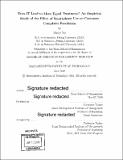| dc.contributor.advisor | Catherine Tucker. | en_US |
| dc.contributor.author | Yu, Shuyi, Ph. D. Massachusetts Institute of Technology | en_US |
| dc.contributor.other | Sloan School of Management. | en_US |
| dc.date.accessioned | 2018-09-17T15:53:22Z | |
| dc.date.available | 2018-09-17T15:53:22Z | |
| dc.date.copyright | 2018 | en_US |
| dc.date.issued | 2018 | en_US |
| dc.identifier.uri | http://hdl.handle.net/1721.1/118002 | |
| dc.description | Thesis: S.M. in Management Research, Massachusetts Institute of Technology, Sloan School of Management, 2018. | en_US |
| dc.description | Cataloged from PDF version of thesis. | en_US |
| dc.description | Includes bibliographical references (pages 67-69). | en_US |
| dc.description.abstract | Customers with more education and communication skills may attract more attention from firms and get better service because they are better placed to advocate for themselves. It is not clear whether the digitization of the consumer complaint process will worsen or improve this situation. To investigate this, we use rich data on customer complaints to the city of Boston. We analyze 364,189 complaints from 2011-2015. Empirically, complaints that originate from areas with high levels of average education are more likely to be solved quickly. However, dedicated mobile app technologies that automate the complaint process can help mitigate the advantage conferred by education. Since the use of digital devices is endogenous to wealth and education, we instrument their usage using granular geographic data on two proxies for cellular signal strength. This analysis again suggests that mobile applications can partially eliminate the disparity between educated and uneducated people in terms of how long it takes to get their complaints resolved. We present suggestive evidence that this is because mobile devices and the standardization of communication they require, eliminate potential differences in treatment of cases that arise due to differences in communication skills. This result suggests that using newer forms of automated digital communication tools enhances equality in customer service. | en_US |
| dc.description.statementofresponsibility | by Shuyi Yu. | en_US |
| dc.format.extent | 69 pages | en_US |
| dc.language.iso | eng | en_US |
| dc.publisher | Massachusetts Institute of Technology | en_US |
| dc.rights | MIT theses are protected by copyright. They may be viewed, downloaded, or printed from this source but further reproduction or distribution in any format is prohibited without written permission. | en_US |
| dc.rights.uri | http://dspace.mit.edu/handle/1721.1/7582 | en_US |
| dc.subject | Sloan School of Management. | en_US |
| dc.title | Does IT lead to more equal treatment? : empirical study of the effect of smartphone use on customer complaint resolution | en_US |
| dc.title.alternative | Does information technology lead to more equal treatment? : empirical study of the effect of smartphone use on customer complaint resolution | en_US |
| dc.type | Thesis | en_US |
| dc.description.degree | S.M. in Management Research | en_US |
| dc.contributor.department | Sloan School of Management | |
| dc.identifier.oclc | 1051300209 | en_US |
